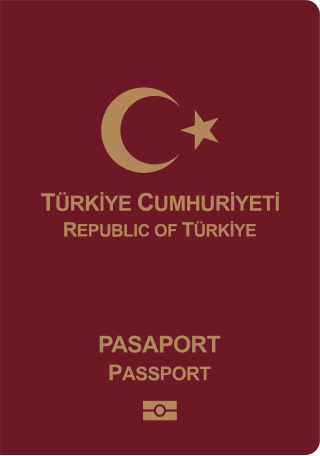Permanent residency is a person's legal resident status in a country or territory of which such person is not a citizen but where they have the right to reside on a permanent basis. This is usually for a permanent period; a person with such legal status is known as a permanent resident. In the United States, such a person is referred to as a green card holder but more formally as a Lawful Permanent Resident (LPR).

Swiss citizenship is the status of being a citizen of Switzerland and it can be obtained by birth or naturalisation.

Dutch nationality law details the conditions by which a person holds Dutch nationality. The primary law governing these requirements is the Dutch Nationality Act, which came into force on 1 January 1985. Regulations apply to the entire Kingdom of the Netherlands, which includes the country of the Netherlands itself, Aruba, Curaçao, and Sint Maarten.

Visitors to the United States must obtain a visa from one of the U.S. diplomatic missions unless they are citizens of one of the visa-exempt or Visa Waiver Program countries.

Polish nationality law is based primarily on the principle of jus sanguinis. Children born to at least one Polish parent acquire Polish citizenship irrespective of place of birth. Besides other things, Polish citizenship entitles the person to a Polish passport.

Hungarian nationality law is based on the principles of jus sanguinis. Hungarian citizenship can be acquired by descent from a Hungarian parent, or by naturalisation. A person born in Hungary to foreign parents does not generally acquire Hungarian citizenship. A Hungarian citizen is also a citizen of the European Union.

Japanese Nationality Law details the conditions by which a person holds nationality of Japan. The primary law governing nationality regulations is the 1950 Nationality Act.

Nationality law of Greece is based on the principle of jus sanguinis. Greek citizenship may be acquired by descent or through naturalization. Greek law permits dual citizenship. A Greek national is a citizen of the European Union, and therefore entitled to the same rights as other EU citizens.

Argentine passport are issued to citizens of Argentina by the National Registry for People (ReNaPer). They were issued exclusively by the Argentine Federal Police up to 2011. Their primary use is to facilitate international travel.

A German passport is an identity document issued to nationals of Germany for the purpose of international travel. A German passport is, besides the German ID card and the German Emergency Travel Document, the only other officially recognised document that German authorities will routinely accept as proof of identity from German citizens. Besides serving as proof of identity and presumption of German nationality, they facilitate the process of securing assistance from German consular officials abroad. German passports are valid for ten years or six years and share the standardised layout and burgundy red design with other EU passports. Every German citizen is also a citizen of the European Union. The passport, along with the national identity card, allows for free rights of movement and residence in any of the states of the European Union, European Economic Area and Switzerland.

Turkish passport are issued in accordance with the Passport Act from 15 July 1950 to Turkish citizens to travel abroad. Citizens of the de facto state of the Turkish Republic of Northern Cyprus are also eligible to apply for a Turkish passport.

Danish nationality law is governed by the Constitutional Act and the Consolidated Act of Danish Nationality. Danish nationality can be acquired in one of the following ways:

The Romanian nationality law addresses specific rights, duties, privileges, and benefits between Romania and the individual. Romanian nationality law is based on jus sanguinis. Current citizenship policy in Romania is in accordance with the Romanian Citizenship Law, which was adopted by the Romanian Parliament on March 6, 1991, and the Constitution of Romania, which was adopted on November 21, 1991.

Overseas Citizenship of India (OCI) is a form of permanent residency available to people of Indian origin and their spouses which allows them to live and work in India indefinitely. It allows the cardholders a lifetime entry to the country along with benefits such as being able to own land and make other investments in the country.
Multiple citizenship is a person's legal status in which a person is at the same time recognized by more than one country under its nationality and citizenship law as a national or citizen of that country. There is no international convention that determines the nationality or citizenship status of a person, which is consequently determined exclusively under national laws, that often conflict with each other, thus allowing for multiple citizenship situations to arise.

Slovak nationality law is the law governing the acquisition, transmission and loss of Slovak citizenship. The Citizenship Act is a law enacted by the National Council of Slovakia in regard to the nationality law following the dissolution of Czechoslovakia. In 2010, it was controversially amended, enacting loss of Slovak citizenship upon naturalization elsewhere. This was said to have affected the 2012 election to some degree.

Georgian nationality law is the organic law governing the acquisition, transmission and loss of Georgian citizenship.

Saudi nationality law, officially called the Saudi Arabian Citizenship System, is the law that determines who is a Saudi citizen.

Bahraini nationality law states who is a citizen of Bahrain. Foreigners are often given citizenship. Bahraini citizenship laws are governed by the Bahraini Nationality Law of 16 September 1963. Bahrain does not currently permit dual citizenship, and a Bahraini citizen who acquires a foreign citizenship loses Bahraini citizenship. Bahraini citizenship can be renounced. However, in 2016, Bahrainis could have applied to the Ministry of Interior to maintain dual nationality. The king has the discretion to grant Bahraini citizenship to those otherwise not qualified. His Majesty the Governor has the discretion to grant citizenship to an Arab individual who has performed a great service to Bahrain. A Bahraini citizen over the age of 20 years has the right to vote in national elections. Bahraini citizens have a right to a Bahraini passport, though in 1996 the Bahraini government was criticised for refusing to renew the passports of some Bahraini nationals, thus imposing an effective exile on these individuals.
A Beibehaltungsgenehmigung is a certificate issued by the German Federal Government in accordance with Section 25(2) of the Nationality Law.























